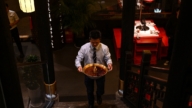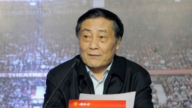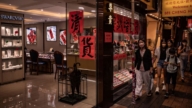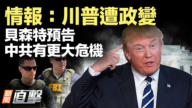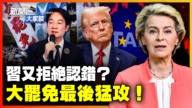【新唐人2012年7月25日讯】虽然中共政府一再表示“决不能让房价反弹”,但根据中共国家统计局7月18号发布的报告显示,6月份中国70个大中城市中,新建商品住宅环比价格上涨的城市有25个,比上个月增加了19个,资料显示,中国房价出现回涨的苗头。然而,对比温家宝在四川所说的“当前经济还没有形成稳定回升态势,经济困难可能还会持续一段时间。”购房者似乎不太支持这一点。
根据《彭博社》报导,随着开发商推出新楼盘吸引购房者,北京的住宅项目6月份的销售额激增了将近50%。
报导还说,中国市值最大的开发商“万科集团”,6月份的合同销售额为133亿元,比5月份增加了24%。中国的女首富吴亚军控制的“龙湖地产公司”,7月5号的公报显示,6月份的销售量比5月份增加了36%。
虽然中共总理温家宝再次保证,继续对房地产市场进行调控,但随着地方政府放松某些购房限制,和中央银行削减利率,房屋销售量和价格都已出现反弹。
美国“南卡罗莱纳大学”艾肯商学院教授谢田表示,中共当局实际不敢让中国的房价垮下去,因为这将带动国家的GDP数字,和整个国家的信贷、就业,以及通货膨胀等问题。与此同时,中国的权贵集团也不希望抑制房价。
美“南卡罗莱纳大学”教授谢田:“中国的房市里边,他最大的受益者或最大的既得利益者,是中共的权贵集团,这些人手中有大量的房子,对中国老百姓来说,这个价格已经涨的离谱,荒谬之高,中共政府从来没有真正的,想把房价真正的压下去,他也许是想制止房价上涨过快的势头,这样就是缓解一下民意和民怨。”
日本《每日新闻》报导,中国由于经济增速放缓,为了提升景气,确保财源,不少地方政府私自放宽了对房地产市场的调控政策。另外,中国央行降息等缓和金融的政策也推动了许多城市的房价上扬,中国的房地产市场似乎有再起泡沫的危险。
谢田认为,中国楼市泡沫化已经出现,而经济学家陈志飞也表示,中国楼市回暖仅仅是昙花一现。
经济学家陈志飞:“这个房价现在看来,是中国宏观经济的一个缩影,这个新一轮的经济回暖,主要还是中共在走投无路的情况下,继续踩三驾马车的最后一驾,就是投资,因为内需和外贸现在都是惨不忍睹,那么从投资来看的话,督促国家银行扩大贷款,使得楼市可能在某种程度上呈现昙花一现的景象。”
陈志飞表示,中国楼市前两年上涨,很多都是热钱炒作造成的,现在针对整个中国经济的发展经营,热钱已经纷纷撤资,这将造成楼市下冲的压力。
经济学家陈志飞:“我觉得这是中国经济不可遏制的进入衰退的一个迹象,正如中国经济的衰退,或者说中央政府的保八…不见得是能够用行政指令来完成的,那么中国楼市的下滑,也不见得是某个长官的意志能够决定的。”
《彭博社》认为,经济增长放缓考验着温家宝的承诺,他保证要一方面促进增长,一方面继续对房地产市场进行调控。报导说,温家宝7月7号在参观江苏省东部时表示,房地产调控处于一个“关键时期”,任务仍然很“艰钜”。
采访/陈汉 编辑/黄亿美 后制/郭敬
Rising Housing Prices Test Wen Jia Bao’s Promise
Although the Chinese government has repeatedly said,
“never let housing prices rebound,”
according to a report from the National Bureau of
Statistics released on July 18,
25 out of 70 medium and large-sized cities in China,
showed signs of price rebounding in the month of June.
That is an increase of 19 more cities since May.
However, this runs contrary to Wen Jiabao’s statement
in Sichuan,
“The current economy has not formed a stable upward trend,
the economic difficulties may continue for some time."
Buyers do not seem to support this.
According to Bloomberg News reports, after developers
have launched new real estate to attract buyers,
residential sales in Beijing surged early 50% in June.
China’s largest developer, “Vanke Group,” had 13.3 billion
yuan in contracted sales in June, an increase of 24 percent compared to May.
In June, “Longhu Real Estate Inc”, controlled by the richest
woman in China, Wu Yajun, showed an increase of 36% in sales volume since May.
Although the Chinese Prime Minister Wen Jiabao has pledged
repeatedly to continue to regulate the real estate market,
home sales and prices have rebounded due to local
governments’ relaxation towards some of the purchase limits and the central bank cutting interest rates.
Xie Tian, Professor of Aiken Business School, University
of South Carolina stated that
the Chinese authorities are afraid of China’s collapsing
housing prices,
because this will drive the entire country’s GDP figures,
the entire country’s credit, employment, and inflation problem.
At the same time, China’s rich and powerful do not want
to curb housing prices.
Xie Tian: “In China’s housing market, its biggest winners
and the biggest vested interest group are China’s rich and powerful.
These people have a large amount of houses.
For other Chinese, the housing prices have gone up
to an outrageous, ridiculous level.
The Chinese regime has never tried to
suppress housing prices.
It might want to stop the soaring housing prices
just to ease public opinion and grievances."
Japan’s Daily News reported that in order to improve
the economy and ensure financial resources in the midst of economic slowdown,
many local governments privately relax control
of real estate market policies.
In addition, China’s central bank cutting interest rates
to ease financial policies also contributed to rising prices in many cities.
Thus, rising prices in the housing market seems to have
renewed the risk of housing bubbles.
Xie Tian believes that China’s housing bubble has already
emerged, but the economist Chen Zhifei says that China’s property rebound is short lived.
Chen Zhifei: “Looking at the prices now, it is a microcosm
of China’s macro economy.
This new round of economic rebound is the Chinese regime’s
last resort in desperate circumstances. That is, continuing to invest.
Because domestic demand and foreign trade are both terrible,
from the investment point of view,
promoting national banks to extend loans is to facilitate
a short-lived prosperity in the real estate market."
Chen Zhifei said that the rising property value two years
earlier was only due to hot money from speculation.
Now the hot money has been diversified and it has turned
into the pressure to drive down the housing prices.
Chen Zhifei: “I think this indicates China’s economy
has entered into a recession.
Just like China’s economic recession, the stability of
the central government cannot be maintained by administrative instructions alone.
By the same token, China’s real estate market decline cannot
be decided by an executive’s will."
Bloomberg News commented, “The economic growth
or slowdown is a test of Wen’s commitment.”
He had pledged to promote growth and to continue
to regulate the real estate market.
Reports cite Wen Jiabao’s comments during a visit
to the eastern Jiangsu Province on July 7,
that real estate regulation is in a “critical period",
and the task is still very “difficult."


